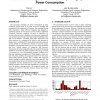Free Online Productivity Tools
i2Speak
i2Symbol
i2OCR
iTex2Img
iWeb2Print
iWeb2Shot
i2Type
iPdf2Split
iPdf2Merge
i2Bopomofo
i2Arabic
i2Style
i2Image
i2PDF
iLatex2Rtf
Sci2ools
116
click to vote
SIGMETRICS
2003
ACM
2003
ACM
Run-time modeling and estimation of operating system power consumption
The increasing constraints on power consumption in many computing systems point to the need for power modeling and estimation for all components of a system. The Operating System (OS) constitutes a major software component and dissipates a significant portion of total power in many modern application executions. Therefore, modeling OS power is imperative for accurate software power evaluation, as well as power management (e.g. dynamic thermal control and equal energy scheduling) in the light of OS-intensive workloads. This paper characterizes the power behavior of a commercial OS across a wide spectrum of applications to understand OS energy profiles and then proposes various models to cost-effectively estimate its run-time energy dissipation. The proposed models rely on a few simple parameters and have various degrees of complexity and accuracy. Experiments show that compared with cycle-accurate full-system simulation, the model can predict cumulative OS energy to within 1% accuracy ...
Related Content
| Added | 05 Jul 2010 |
| Updated | 05 Jul 2010 |
| Type | Conference |
| Year | 2003 |
| Where | SIGMETRICS |
| Authors | Tao Li, Lizy Kurian John |
Comments (0)

